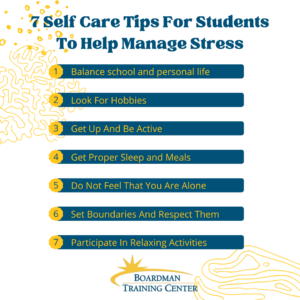If you decide to start your post-secondary training, you will need to be prepared for the various stressful experiences you will encounter. Unfortunately, stress will be a part of your life throughout your training journey and beyond, so it is important to be able to manage it. Here are 7 self-care tips from the Boardman Training Center to help you manage your stress.
1.) Balance Your Personal Life With Your School Life
First, it’s essential to maintain a healthy equilibrium between your personal and academic lives. Putting too much weight and focus on one aspect can unnecessarily raise stress levels. That is why it is imperative to establish a harmonious blend of these two aspects. In fact, we offer an entire blog filled with tips to help you achieve this balance between your personal and academic life.

2.) Look For Hobbies
During high-stress moments, the inclination might be to concentrate solely on the immediate task. Yet, there are more effective approaches than this. Taking a brief intermission to indulge in one of your hobbies, or even exploring a new one, can serve as an excellent stress-relief strategy. This brief respite provides enjoyment and temporarily redirects your focus away from the stressor.
However, it’s crucial to avoid becoming so immersed in your hobby that you completely lose track of time. The task at hand, whether it’s homework, exam preparation, or something unrelated to academics, still requires your attention for completion. To prevent time from slipping away unnoticed, consider employing a timer as a helpful reminder.
3.) Get Up And Be Active
We also recommend avoiding spending all day stationary when doing homework. Even if it is just taking a walk, the Mayo Clinic reports that exercise and activeness can help improve your mood by increasing endorphins and reducing the adverse effects of stress.
4.) Get Proper Sleep and Meals
One of the most important tips for students to help manage stress that we can offer is getting the proper amount of sleep each night. According to WebMD, the average adult should sleep between 7 and 9 hours a night, but some adults may need as many as 10 hours. Outside of making you less productive, sleep deprivation can lead to you suffering mood changes.
Another thing equally important as getting enough sleep is ensuring you eat enough food every day. Additionally, it is important to consume proper meals and not rely strictly on snacks. These meals will provide the proper nutrients and energy to help you get through the day. Being low on energy can lead to your work taking longer than it should, and it can lead to increased stress.
5.) Do Not Feel That You Are Alone
If you feel yourself starting to get overwhelmed by stress, do not feel that you are alone. You can seek support in a numerous amount of different ways. You can talk to a close friend or family member or schedule an appointment with a therapist. At the end of the day, it is best to use whichever you feel more comfortable doing, and it is perfectly okay to seek help when you feel overwhelmed.
6.) Set Boundaries And Respect Them
Another way to help manage your stress is to set boundaries. However, setting boundaries is only one part, and respecting your chosen boundaries is important. This does not mean that you should ignore previous commitments, but it does mean that you can say no if someone asks you to do something additional. An overloaded schedule will only increase your stress.
7.) Participate In Relaxing Activities
In addition to pursuing your hobbies, taking part in other relaxing activities can serve as a way to decrease your stress. These relaxing activities will help you keep calm, prevent you from being overwhelmed, and serve as a temporary distraction. Like your hobbies, you should set a timer to ensure you do not spend too much time on one of these activities. It is subjective as to what people find relaxing, but here are a few examples:
Meditation
Meditation is a quick and easy way to reduce stress as it requires no special equipment. This makes it very easy to meditate. According to the Mayo Clinic, meditation allows you to control your emotions. This can be incredibly useful in helping you manage future stress.
Music
Music can help reduce stress, promote healing, and improve the listener’s overall well-being, according to a Michigan State University study, by stimulating the production of dopamine. You can listen to music at all times, which makes it more accessible than the other two activities on the list. This also means that you can work on your homework while listening to music.
Yoga
According to the American Osteopathic Association, one of yoga’s biggest benefits is that it helps reduce stress, improves overall well-being, and helps develop coping skills. Better coping skills can help you manage your stress in the future. Outside of the mental benefits, yoga has many physical benefits, as well.
Continue Your Training At Boardman Training Center
If you’re looking for a school that can offer a personalized learning experience, Boardman Training Center may be for you. Get started today by calling (330)-729-9244 or Requesting Information.
